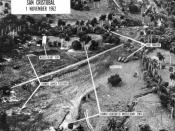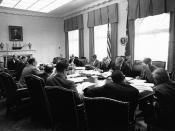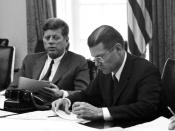The Cuban Missile Crisis was the closest the world had come to nuclear war to that point in history. The Soviet military commanders were ready to launch nuclear weapons in their quest to defend Cuba and the armed forces of the United States was at its highest state of readiness. The fact that this nuclear tragedy did not eventually occur is a reflection upon the actions of the key individuals involved. Both Kennedy and the Soviet Premier Nikita Khrushchev played major roles in averting a nuclear war which was seen at the time as quite possible. However, in light of evidence acquired by historians, there is doubt about how much credit Kennedy can take for the results of the crisis in 1962, in being classed as a hero. The roles of the major politicians involved in the crisis, both American and Soviet are fairly well documented as well as the actions of Kennedy himself.
Thus it is questionable as to whether Kennedy was given credit for the actions taken by others, simply because he was the President. However, sources show the contrasting views over the actual consequences of the crisis. These contrasting views ultimately effect the way in which Kennedy is perceived as a hero. Therefore, the perception that the Cuban Missile Crisis allowed President Kennedy to be perceived as a hero is ambiguous and thus helps to understand whether his heroic qualities are manufactured simply because of the position he occupied.
Following the Bay of Pigs incident in April 1961, Russia had increased the aid to Castro in Cuba and had begun to include military supplies. In August 1962, there was evidence that the Soviet Union had begun to install missile sites in Cuba, perhaps to protect Cuba from invasion. The main issue in Cuba was prestige. The Kennedy...



...
Superbly structured essay. Good support of theis, well written.
6 out of 6 people found this comment useful.